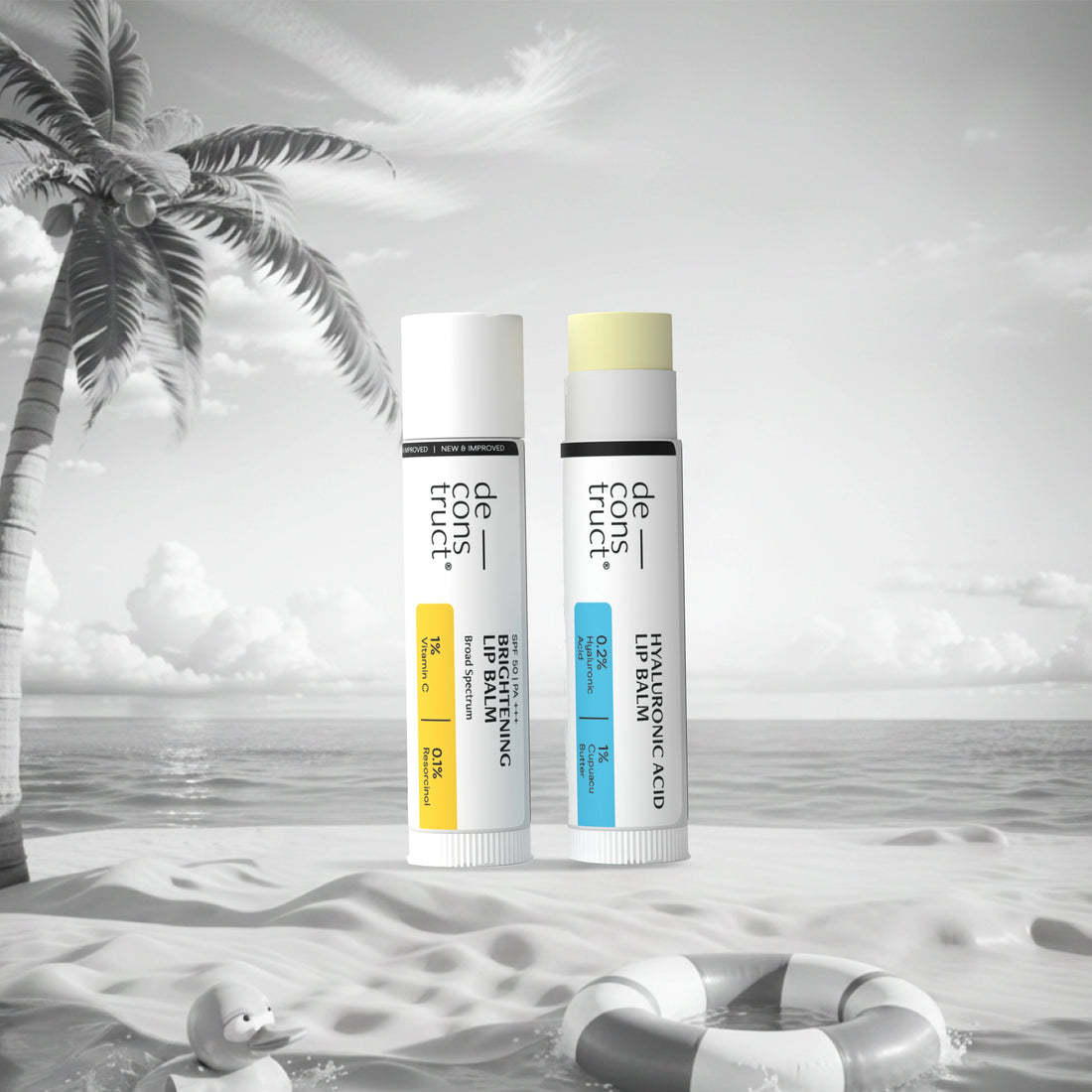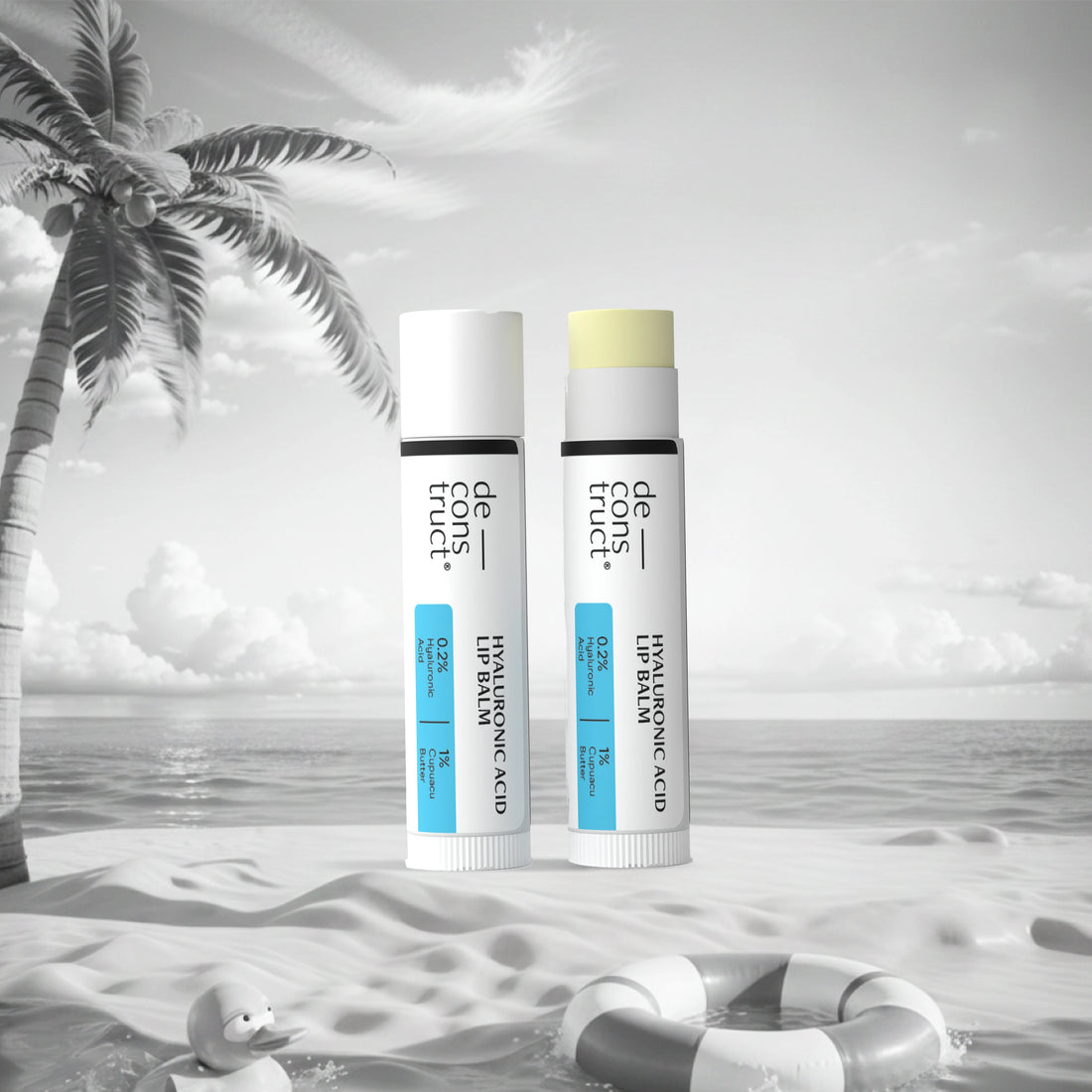Lips are that one body part that often doesn't receive the care it deserves. People only remember to take care of their lips when they are dry, cracked, or hurt. Even though they are little, the lips are incredibly sensitive. They are always outside in the sun and changing temperatures. When the weather is cold or windy, they dry out faster since they don't have oil glands or a protective coat.
An excellent balm keeps your lips moist, shields them from bad weather, and retains moisture in them. Most dermatologists recommend that you should apply it every day to keep your lips healthy and comfortable, not just when they hurt.
In this lip balm guide, we’ll cover the benefits of lip balm, the types of lip balm, possible lip balm side effects, and how to choose lip balm based on your needs.

Deconstruct — Brightening Tinted Lip Balm (1% Vitamin C + 0.1% Resorcinol, SPF 30 PA++)
What Is the Use of Lip Balm & Why It’s Important
Using lip balm is part of taking care of your skin. It makes your lips softer, smoother, and safer. It prevents water loss by setting up a barrier of light.
The skin of the lips is thinner and doesn't have oil glands, which is why it dries out faster. Wind, sunlight, and warmth, even if you stay indoors, are all things that can dry out your lips and cause cracks and soreness.
If you ever wondered is lip balm necessary, the answer is absolutely yes, especially in harsh, dry, or sunny climates. Using a balm while the air is dry could soothe irritation and redness when the weather around you changes. This habit keeps lips comfortable all year round.
Do you have to put lip balm on every day?
Using a lip balm every day helps protect your skin from being dry, irritated, or cracked, especially when it's cold, dry, or sunny outside.
Top Benefits of Using Lip Balm
Using a lip balm has more benefits than just making your lips look good. It protects, heals, and feeds the sensitive skin of your lips while also making them feel better and smoother. Many lip balms feature ingredients that protect lips from the sun or help cure damage, which makes them healthier over time. These benefits of lip balm make it an essential.
Moisturizes and prevents dryness
Shea butter, hyaluronic acid, and plant oils are wonderful for your lips because they keep moisture in. If you use lip balms regularly, your lips will get smoother, and the small dry lines will go away with time.

Deconstruct — Hyaluronic Acid Lip Balm for Dry & Chapped Lips
Protects against the sun, wind, and heat
Long exposure to the sun could induce pigmentation, irritation, or early aging. Lip balms with SPF keep your lips from chapping in both hot and cold conditions and protect them from UV rays.
Heals chapped lips faster
If your lips hurt or are dry, just drinking water might not be enough to help. Use emollient-rich moisturizing balms to form a layer on the lips that repairs them and keeps them soft.
A clinical study by J Cosmet Dermatol[1] done on the efficacy of a lip balm show that lip balms containing barrier-strengthening ingredients like pseudo-ceramides significantly improve dryness and comfort in sensitive lips.
Types of Lip Balm & How to Choose the Right One
|
Type of Lip Balm |
Key Ingredients/Formula |
Best For |
|
Petroleum-based (Occlusive) |
Petrolatum, mineral oil |
Extreme dryness, chapped or peeling lips |
|
Natural/Oil-based |
Beeswax, shea butter, cocoa butter, coconut oil, plant oils |
Sensitive lips, everyday nourishment |
|
Tinted/SPF Lip Balms |
Wax/oil base + pigments + SPF filters (zinc oxide, titanium dioxide, avobenzone) |
Daytime protection & subtle tint |
|
Medicated Lip Balms |
Menthol, camphor, Methyl Salicylate, hydrocortisone |
Cracked, infected, or severely chapped lips |
Here are a few tips to help you choose your perfect lip balm.
-
Choose a product that is fragrance-free and is safe for those with allergies if your lips are sensitive.
-
Use a lip balm with an SPF of 15 or higher during the day.
-
A lip balm with ingredients like hyaluronic acid, ceramides, and shea butter is beneficial for your skin.
-
If you prefer a natural lip balm, make sure it doesn't contain irritating essential oils or strong scents.
Possible Side Effects of Lip Balm
Lip balms side effects are uncommon and are usually triggered when you use them excessively leading to discomfort or minor outbreaks.
Some common issues are:
-
Irritation or allergy: Strong fragrance, menthol, or camphor could the skin around your lips sting or cause an allergic reaction.
-
Pore congestion: Thick, heavy balms can clog poresand can cause outbreak around the lips.
-
Dependence myth: Some people think that lip balm stops the lips from moisturizing themselves and cause irritation. Lips don’t get “addicted”; the irritation is usually from bad ingredients, and not the usage. In fact, putting on balm is less likely to cause irritation than applying the improper components.
Using products that are soft and don't have a scent, like the Deconstruct's Brightening Lip Balm, decreases the possibility of irritation. If you have swelling or redness that doesn't go away, you should always see a dermatologist.
How to Use Lip Balm Correctly
Knowing how to apply lip balm is easy, but there are several things you can do to make it work better.
-
Make sure your lips are clean and dry before you apply the lip balm. Get rid of any food or makeup that is still on them.
-
Put on a thin, even coat after cleaning your teeth in the morning and before heading outside.
-
Put it back on after you eat, drink, or wipe your lips.
-
Most dermatologists say that you should put lip balm on your lips two to three times a day to keep them safe.
-
Put on a thicker coat before bed to act as a mask while you sleep to help your lips heal.
-
Before you go outside, put on lip balm with SPF. Apply it every two hours while you're outside, put on more.
Final Thoughts: Why Lip Balm Is Essential for Healthy, Hydrated Lips
Lip balm not only makes your lips appear good, but it also keeps them healthy. Lips that are well-hydrated stay supple, flexible, and free of cracks. They can deal with changes in the weather and their routine better if you use them a lot.
Before you choose a lip balm, think about what your lips really need. Do they need a balm that makes their skin seem better for pigmentation or a thicker, more moisturizing balm for dryness? Knowing how to choose lip balm to deliver what your lips require every day will make your lips feel and look a lot better.
If you’re still confused about how to choose lip balm and where to look for them, explore our curated list of dermatologist-approved lip balms for daily use.
-
The Deconstruct Brightening Lip Balm with SPF — Ideal for daily sun exposure and pigmented lips. The formula includes 1% Vitamin C + 0.1% Resorcinol and broad-spectrum SPF for protection and lightening.
-
The Deconstruct Brightening Tinted Lip Balm Combo (1% Vitamin C + 0.1% Resorcinol + SPF 30) combines lipcare benefits with a tinted finish. It is perfect if you want some colour plus treatment in one product.
-
The Deconstruct Day & Night Lip Care Duo (Brightening + Hyaluronic Acid Lip Balm) This combo contains one lip balm for daytime brightening, the other richer hyaluronic formula to heal your lips overnight. This simple routine for day and night keeps your lips healthy and plump all day.
References
FAQs
What is the main use of lip balm?
Lip balm helps retain moisture, smooth texture, and protect lips from dryness and environmental damage. Lip balm makes lips soft and smooth and protects them from the weather.
Why is lip balm important for daily lip care?
Using a lip balm daily use keeps lips soft, hydrated, and shielded from harsh weather and UV exposure.
Is lip balm necessary to use every day?
Regular use supports healthy lips, particularly in climates that are dry, cold, or sunny.
What are the benefits of using lip balm regularly?
Benefits of lip balm include restored moisture, smoother lips, and sped up healing of chapped lips.
Can lip balm cause any side effects or irritation?
Some lip balms with strong actives or scents could make your lips feel irritated. Pick balms that are not harsh and don't have strong fragrances to avoid lip balm side effects.





